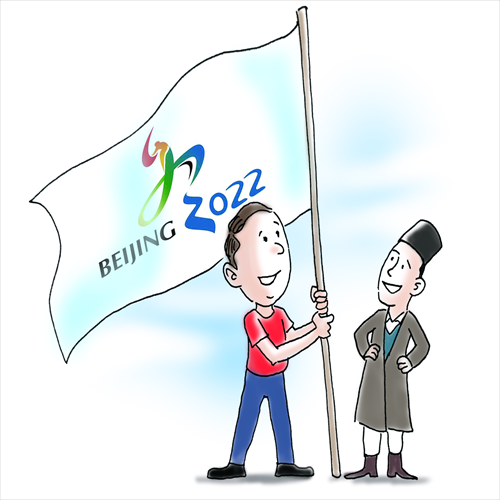Olympic bid connects Beijing and Almaty

Illustration: Liu Rui/GT
In a close vote of 44 to 40, Beijing and Zhangjiakou defeated Almaty, the former capital of Kazakhstan, on Friday. Maybe it was the first time that many Chinese as well as others around the world had heard of the city. However, Kazakhstan is one of China's most important partners on the new Silk Road.
Commenting on the games, my friend in Kazakhstan, who is 32 years old and loves playing soccer, said, "Our economic situation is stable and most people will support the government to continue to bid to host Winter Olympics."
He thinks that Kazakhstan wants to hold the Games not to make a profit, which hardly any city does by hosting the Olympics, but for its national image and dedication for sports. He argues that Almaty has the advantage of actual snow, good air quality and better sports fields over Beijing, because Almaty has hosted Asian Winter Games before, while Beijing is more experienced in organizing large-scale international events and providing security.
In the end, he expressed congratulation to Beijing in perfect Putonghua. He is an ethnic Kazakh born in Xinjiang, the northwestern part of China who migrated to Kazakhstan after middle school. He said he has many Xinjiang-born Kazakh friends like him in Kazakhstan, speaking both Kazakh and Chinese.
This reminds me of my primary school classmate in Urumqi, a beautiful and elegant Kazakh girl with blonde hair. She also moved to Kazakhstan and is doing a PhD in Russia now. Kazakhstan may have the greatest number of Chinese speakers among the countries along the Silk Road economic belt.
Meanwhile, over one million ethnic Kazakhs are living in China now, primarily in the Yili Kazakh Autonomous Prefecture in Xinjiang; many of them have relatives in Kazakhstan or have lived temporarily in the country. These people can serve as a natural bridge between China and Kazakhstan in cultural and economic relations.
Kazakhstan is the largest country in Central Asia, and one of the largest by territory on the Silk Road. Chinese President Xi Jinping first proposed the grand plan of "Silk Road economic belt" (later incorporated into the "One Belt, One Road") in Kazakhstan in late 2013.
The president of Kazakhstan, Nursultan Nazarbayev, who has led the country since independence in 1991, is also enthusiastic about rebuilding the ancient route and has proposed his own "Bright Road" strategy.
The common vision of China and Kazakhstan is becoming true.
During my visit to Novosibirsk in Russia's Siberia in January 2015, a Chinese businessman working there told me the goods he imports from China often enters the Russian territory via the railway system in northeastern Kazakhstan. The only river in China that flows to the Arctic Ocean, the Ertix, presents a potential waterway passage among China, Kazakhstan and Russia. Natural gas from Turkmenistan is transported to China through the pipeline in Kazakhstan.
However, there are still some obstacles in China-Kazakhstan relations.
Recently, two pieces of news have received wide attention on the Chinese Internet. One is that Chinese workers working for an oil and natural gas project fought with Kazakh workers. The other is that one Chinese visitor to Kazakhstan has written a long travelogue, criticizing corruption among Kazakh police and custom staff.
My friends in Kazakhstan admitted that corruption does exist in the Kazakh officialdom and needs to be curbed. One the other hand, they said corruption is not specifically directed against Chinese people. Besides, some Chinese businessmen who attempt to bribe Kazakh officials to bypass the laws and regulations are also to be blamed.
But all in all, my friends both in China and Kazakhstan have a positive outlook of China-Kazakhstan relations.
The author is deputy dean of China World Agendas Academy, Southwestern University of Political Science and Law. opinion@globaltimes.com.cn